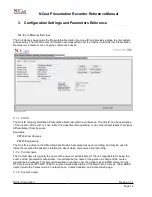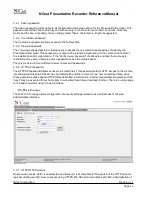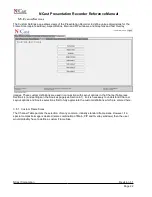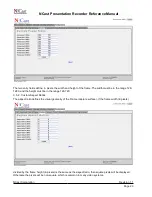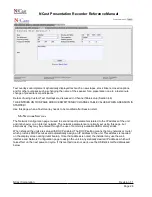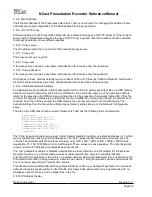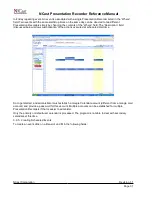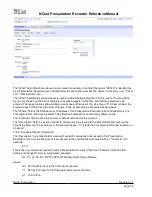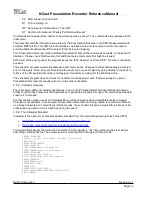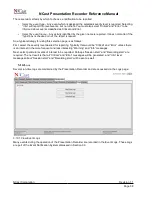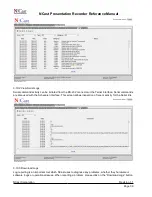
NCast Presentation Recorder Reference Manual
3.6.8. MAC Address
The Ethernet address of the Presentation Recorder. There is no provision for changing this address. Some
networks may require registration of the MAC address for proper operation.
3.6.9. Use HTTP proxy
Software updates for the Presentation Recorder are achieved through use of HTTP protocol. If the network
being used is firewalled and requires the use of HTTP Proxy services, then this checkbox must be enabled
for proper downloads of new software updates.
3.6.10. Proxy server
The IP address (symbolic or numeric) of the network’s proxy server.
3.6.11. Proxy port
The proxy server port (e.g. 80).
3.6.12. Proxy user
If the proxy server requires a username and password for access, enter the username.
3.6.13. Proxy password
If the proxy server requires a username and password for access, enter the password.
All changes to these network settings require a reboot of the unit. Press the “Update & Reboot” button when
all entries are complete and you have double-checked the correctness of these entries.
3.6.14. USB Stick Network Settings
An alternative way to configure network parameters for the unit is to edit a special text file on a USB memory
stick and to insert that memory stick into any USB slot in the unit during power-on. The operating software
looks for the presence of a USB memory and searches for the presence of a specially named file. If this file
is found, the network parameters are read from the file, installed into unit and used during the network boot
process. Once the unit has booted, the USB memory may be removed and is not required again. The
network settings from the file will be reflected as permanent entries shown on the Network Configuration
page.
The file on the USB stick must be named “ntwkconf.txt” and has the following lines of information:
dhcp=(bool)0
dns_1=(string)204.89.223.4
dns_2=(string)204.89.223.44
ethernet=(string)auto
gateway=(string)204.89.223.1
ipaddress=(string)204.89.223.25
netmask=(string)255.255.255.0
ntp=(bool)1
The “dhcp” keyword accepts two values: 0 which means disabled (no dhcp, use static addresses) or 1 which
means enabled (use dhcp, dynamic addresses). The “dns” values identify the domain name servers. The
“ethernet” keyword accepts these link-level values: auto, 10fd, 10hd, 100fd, 100hd, 1000fd, 1000hd (auto
negotiation, 10, 100, 1000 Mbps, Full or Half Duplex). These values are case sensitive. The other keywords
require numeric IP addresses or netmasks as shown above.
The “ntp” parameter enables or disables network time protocol within the unit. If enabled, the Presentation
Recorder must be on a network where access to public network time servers is available. Disable
(ntp=(bool)0”) this parameter if the unit is on a closed network. Setting this parameter to 0 is useful when the
Presentation Recorder is being used with a simple hub or switch. Long bootup times will be shortened as the
box is no longer searching for network time servers.
This file should be created/edited with any simple ASCII text editor (e.g. Notepad, Teachtext). Do not use an
advanced word-processing editor to alter this file. Each key=value pair must be on a separate line with no
whitespace prior to the key, and no blank lines in the file.
3.6.15.IP Address Display
NCast Corporation
Revision 1.1
Page 28



